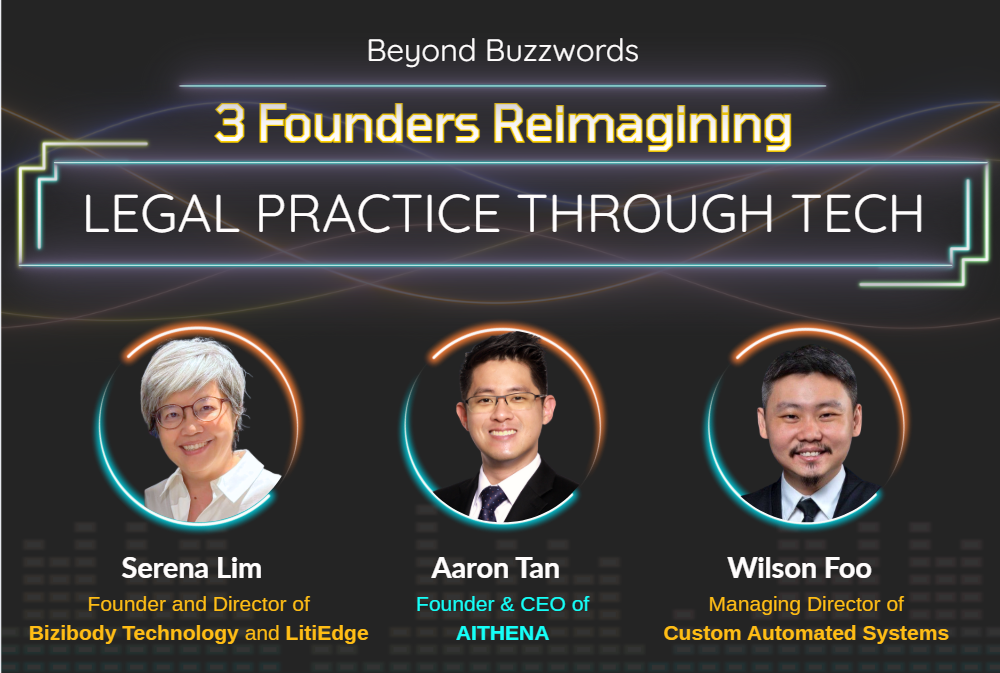
Beyond Buzzwords: 3 Founders Reimagining Legal Practice Through Tech
LegalTech has moved far beyond its early buzzword status. Today, it is a critical pillar of modern legal practice not just for efficiency, but for sustainability, access, and resilience in a fast-evolving profession.
Yet, the most transformative LegalTech solutions do not emerge from shiny tech pitches or one-size-fits-all platforms. They are shaped by practitioners who know legal workflows inside out: the bottlenecks, the repetition, the missed opportunities. This article features three LegalTech founders — Serena Lim (Bizibody), Wilson Foo (Caselist, ProQuaere, Didpol) and Aaron Tan (AITHENA).
From leading the way in early virtual court hearings to automating legal documents bundles of authorities, and developing seamless legal research tools, these founders are solving challenges to make legal work more efficient, smarter, and human-centered.
Built from the Ground Up: LegalTech That Solves Real Problems
Serena Lim was working on/developing LegalTech before the term became mainstream. When she launched Bizibody in 2000, law firms had not established websites, e-filing was still a future prospect, and the idea of holding remote hearings sounded almost impossible.
“We were building the future in slow motion,” she reflects. But that did not stop her. Serena collaborated with the State Courts for Justice Online in 2002, a groundbreaking platform enabling lawyers to attend pre-trial conferences virtually, over a decade before Zoom became mainstream. Around the same time, she contributed to the LawNet Legal Prospector 2 project, developing Reference Trace - a tool that quietly laid the groundwork for AI-powered legal research embedded in LawNet today.
Her long-term vision and early investment in user-friendly legal infrastructure paid off. “Sometimes, being ahead of your time means planting seeds you won't see bloom for decades.”
Today, Serena continues to work at the intersection of consultancy and product development, creating tools that are tailored to local needs yet built to scale. With the rise of generative AI, she sees traditional barriers collapsing, allowing niche problems to be solved faster, more affordably, and more creatively.
For Aaron Tan, co-founder of AITHENA, LegalTech is not abstract, it is personal. A young lawyer himself, Aaron designs solutions while actively practising law, giving him a unique edge in identifying friction points and inefficiencies in real time.
“We are directly in the trenches,” he says. His team focuses on high-impact areas like legal research, due diligence, and contract risk analysis, all with minimal disruption to lawyers’ workflows. “We prioritise solutions that require the least change to implement, because lawyers are creatures of habit. If it is not broken, they do not want to fix it.”
Far from being a disadvantage, Aaron’s youth and casual presence have helped him and his team build authentic, long-term relationships. “We can provide lasting service over time. And we understand our peers’ problems because they are our problems too.”
AITHENA is backed by a multidisciplinary team, combining legal, tech, and AI expertise. But at its core is a simple, powerful mission: to make legal practice easier, faster, and smarter — not by reinventing the wheel, but by refining it.
A lawyer by training and a developer by necessity, Wilson creates tools to solve problems he has personally experienced and that no one seemed to be addressing.
He created Caselist, born from his days as a student at SMU Law School. Faced with manually downloading large batches of cases from LawNet, he built a tool that automated this process. That simple idea grew into a full-scale bundle compiler for litigation work, saving hours of time previously wasted on manual collation and formatting.
He then developed ProQuaere, a platform that streamlined appointment bookings and video conferencing for lawyers—a seemingly simple gap that larger platforms had overlooked. His third venture, Didpol, addresses document automation for deed polls and HDB Powers of Attorney. The next version which is currently in development will use an open-source legal programming language, free from the proprietary lock-ins of commercial software.
Wilson’s ethos is clear: automation does not have to mean big tech. “A lot of automation is done by startups like us. Our prices are reasonable. And we free up time that lawyers can use on real, value-added work.”
What Ties Them Together
Serena, Wilson, and Aaron come from different points in their careers, but share a common thread: they build from the inside out. Each founder started with a clear pain point, shaped by lived experience. Each chose targeted solutions over impractical platforms. Together, they represent a new breed of LegalTech builders: grounded in practice, focused on users, and committed to building a more responsive legal profession.

